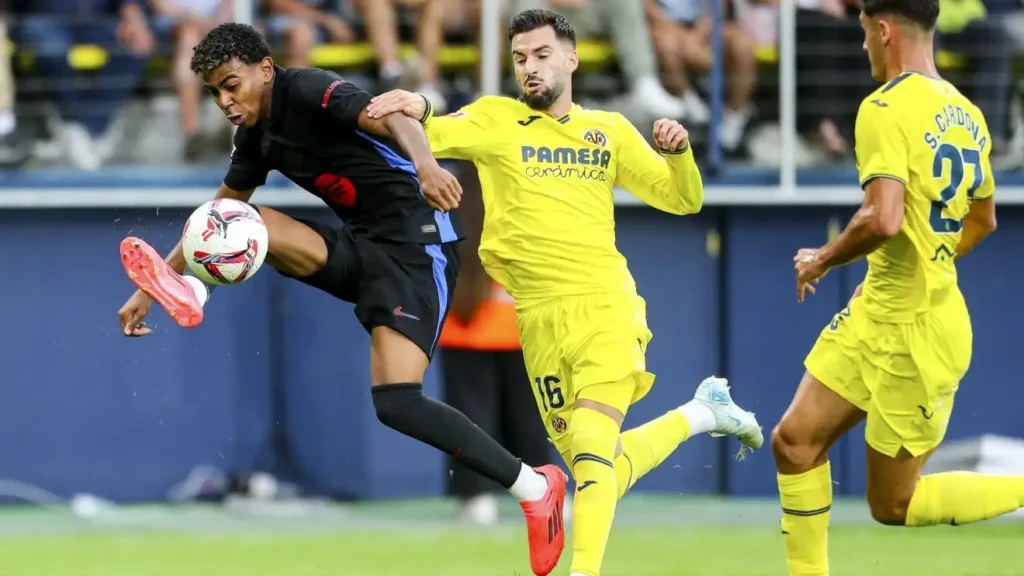
This week has been extremely competitive for the title of the most foolish comment made by a football official.
Ex-Romanian international and UEFA delegate Florin Prunea referred to Jurgen Klopp as a “circus” performer and someone “gnawing on bricks with his teeth.”
FIFA chief Gianni Infantino pulled his nose from Trump’s backside just long enough to declare that ‘of course, Mr. President, you can shift World Cup matches despite regulations clearly stating you have no authority to do it’.
Yet, the most foolish comment made this week was by Rafael Louzan, the president of the Spanish football federation.
Spain is not opposed to some strange remarks. Javier Tebas is always close to a microphone, as the openly Madrid-supporting La Liga president (which seems strange) is eager to criticize Barcelona, or if he’s in the mood to attack further, Manchester City and PSG.
Though he might criticize the state-funded clubs for their endless resources, the league’s recent proposal makes it evident he would eagerly take advantage of the same situation if roles were reversed.
Matchday 17 of the La Liga season has Barcelona visiting Villarreal for a standard league matchup—except they won’t be traveling the 250km distance south; instead, they will go 7,500km west until they arrive in Miami.
This event, initially revealed earlier this month, has been awaited for quite a while. The Supercopa de España – Spain’s equivalent of the Community Shield – has been held in Saudi Arabia since 2020. Barcelona has participated in four pre-season exhibition matches in Miami, and their most legendary player ever now resides in the Florida city.
This concept is evidently borrowed from various sports, especially the NFL, which has conducted games in the UK, Germany, Brazil, and Ireland, with Spain and Australia preparing to host some in the future.
The reason for the foundation being established is agreed upon throughout Europe: Fear of the Premier League.
A study conducted by Deloitte revealed that the Premier League clubs generated average revenues of €7.26 billion for the 2023/24 season. By contrast, La Liga and the Bundesliga stand at €3.8 billion. Clubs in Serie A have a total of €2.9 billion, whereas Ligue 1 is the lowest with €2.6 billion.
Tebas has frequently cautioned that the Premier League bubble will explode, yet in the interim, England’s top division has gathered the finest talent and managers available. It’s not only the major teams; this transfer window featured a promoted club acquiring the number nine from four-time Champions League titleholders Ajax.
The Premier League issue has been escalating for many years, and those on the outside tried to eliminate this specific rattlesnake in 2021 with the European Super League, a nearly exclusive tournament for Europe’s elite clubs that would ensure the 12 founding members a consistent revenue stream. It was portrayed as clubs growing frustrated with UEFA, but the true aim was to establish this as the new Premier League. It backfired dramatically and led to the loss of jobs for numerous executives
However, even after the protesting supporters went home, La Liga and Serie A have continued seeking ways to increase their revenue since then. The declaration of the Villarreal–Barcelona match in Miami occurred shortly after the Italian football federation approved a Serie A game between Milan and Como to take place in Perth, Australia – a staggering 13,700km from its intended venue.
This brings us back to Rafael Louzan, the president of the Spanish football federation. In defending the Miami game, Louzán characterized it as “beneficial for football.” He even claimed it was a “reward” for international fans of “the Spanish La Liga games.” But when does it cease to be Spanish?
Disregarding the sporting issue that Villarreal is experiencing a defeat at home and both teams have two long flight journeys to manage, Louzan’s point weakens rapidly.
Louzan attempts to construct a story that this game is not motivated by the clubs and the league seeking financial gain, but rather because they wish to “reward” the fans who back the club, which, to be frank, is nonsense. They are pursuing it because the US represents one of the largest markets globally, and with the World Cup approaching next year, leaders worldwide desire their share of the profits.
Is it “good” for Perth Glory to have their local supporters deciding whether to attend an away match or remain at home to watch Milan? What benefit does it bring to the A-League when these prominent European teams visit and overshadow their competition? How beneficial is it for Villarreal supporters who have attended matches at El Madrigal for years to now see ‘home’ games on television? How will the bars and restaurants in the city and Milan manage without one weekend of matchday fans visiting them?
La Liga and Serie A may look to the NFL for validation, yet the cultural environments of the two sports are entirely dissimilar. Since the NFL’s inception in 1920, 20 franchises have relocated to completely different cities, and the vastness of the country means that teams covering significant distances is widely accepted.
Regarding the European League of Football, American football lacks a significant presence in Europe apart from the NFL. Football is played everywhere, and a valid argument exists that when Barcelona or Milan enter these regions and attract all the fans, it is not “good for football” and is, in fact, detrimental to the local teams striving to expand their audiences.
The simplicity with which this has been approved is also worrisome. In a strange scenario where they are unexpectedly the heroes, Real Madrid stands alone in presenting any genuine challenge, claiming it would mark a “before and after” in football. UEFA and FIFA have continued to be ineffective by claiming it’s someone else’s responsibility and beyond their control. UEFA president Aleksander Čeferin attempted to argue that it doesn’t create a “precedent,” which is not how precedent functions
This all returns us to what Madrid initially referred to as a “before and after” moment in football. It might never occur in the Premier League or Bundesliga, where supporters are often more outspoken in their grievances, yet it seems like the initial move on a precarious path where this becomes the standard expectation.
This brings us to a fundamental question: What is a football club if it does not embody its community? Most Barcelona supporters present at the Miami match might not have visited the city, never experienced the Camp Nou, or understood what it means to be Catalan.
Football ought to embody the supporters and individuals who built the club into what it is, and it becomes quite challenging to achieve that when they are 7,500 km distant. Apologies Louzan, this might benefit your finances, but don’t attempt to persuade us it’s advantageous for football


